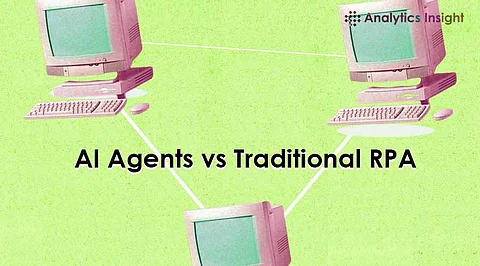

Automation is revolutionizing the way businesses function — making processes faster, more efficient, and less error-prone. Two leaders in the transformation are traditional Robotic Process Automation or RPA and AI agents.
Although both are potent tools under automation, their capabilities and applications are light years apart. Familiarization with the differences will be imperative to any organization that seeks to adopt the perfect solution for its needs.
Traditional RPA is a technology designed for the automation of repetitive, rule-based tasks performed by a human user. This could be data entries, invoice processing, reporting generation, and more predictable activities. Those workflows, using predefined and structured inputs, are what traditional RPA uses to perform operations with incredible accuracy.
Traditional RPA involves software bots mimicking human behavior when interacting with digital systems. For instance, an RPA bot can fill out forms, navigate through applications, copy-paste data, and extract data from emails. Since the bots only do what they have been instructed to do, they are incredibly reliable for mundane, repetitive processes.
However, RPA has its limitations. For example, RPA is not open to unstructured data and cannot, on its own, decide on fresh, unique circumstances without being nudged by the human mind. More sophisticated automation makes use of AI agents.
AI agents are a type of automation tool that utilizes artificial intelligence. Unlike traditional RPA, these agents learn, reason, and adapt to new scenarios. They use technologies like machine learning, NLP, and computer vision to understand complex data and make informed decisions.
An AI agent can read customer sentiments from emails, have intelligent responses to a chatbot, or even optimize the functioning of supply chain operations based on real-time data. These agents do not require the rule-based framework to operate, can learn from patterns and trends, and improve themselves progressively over time.
AI agents' adaptability makes them highly effective in handling dynamic, unstructured, or data-driven tasks. They can process large volumes of data, derive insights, and act on the insights for businesses to achieve smarter automation.
Traditional RPA is very good for simple, repetitive tasks that are rule-based. It cannot be used for processes that require judgment or complex problem-solving. AI agents are designed for more sophisticated methods, including unstructured data or ambiguous scenarios.
RPA bots only work according to the programming laid in them and cannot learn or adapt unless they are reconfigured. AI agents learn from data and past experiences so that better quality work can be delivered over time, without requiring human intervention during the process.
Traditional RPA only deals with structured data, such as spreadsheets or databases. AI agents can both deal with structured as well as unstructured data, images, audio, and free text.
RPA bots need explicit instructions for everything. If there is an exception, it needs to be intervened upon by a human. AI agents can make decisions and thus can handle exceptions autonomously by interpreting the context and making decisions appropriately.
Scalability in RPA is usually about adding more bots to deal with more work. AI agents, on the other hand, scale much better through more sophisticated algorithms and cloud computing, which help to process more extensive data and more complex work.
RPA is most suitable for automated, manual repeat tasks that don't involve critical thinking. For instance, finance, healthcare, and retail are industries applying RPA for the automation of work activities such as data migration, claims processing, and inventory management.
The key value from RPA comes in immediately by cutting down error levels, improving efficiency, and making human workers free to do higher-value work. Still, it only is best for processes with stable and predictable workflows.
The best fit for applying AI agents lies in scenarios with a need for adaptability, intelligence, and decision-making. Customer services, fraud detection, predictive maintenance, and personalized marketing are some of the common uses of AI agents.
Using AI agents allows an organization to overcome compelling issues, process large-scale data, and offer more customized experiences to customers. The AI agent lets companies explore new frontiers of innovation and efficiency.
Even though both are helpful automation tools, each has a different applicability. While RPA fits best into relatively simple processes involving rules of automation, the intelligent and agile capabilities make AI agents valuable for undertaking intricate, adaptive, and volatile activities.
This is based on the specific needs of an organization. In most cases, a combination of RPA and AI agents will be the best to deliver results because it combines reliability with intelligence in order to provide a comprehensive automation strategy.
